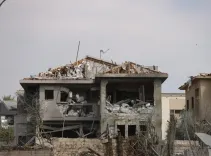Was the Attack on the US Military Base in Qatar an Act of Self-Defence by Iran?

Synopsis
Key Takeaways
- Iran claims self-defense under international law.
- Qatar condemns missile strikes as violations of sovereignty.
- US bases reportedly safeguarded by advanced defense systems.
- Calls for dialogue to prevent further escalation.
- Potential regional instability highlighted by both nations.
Tehran, June 24 (NationPress) Iran announced on Tuesday that the military strikes targeting the US military base 'Al-Udeid' were an "act of self-defence" and were unrelated to Qatar.
On Monday, Iran reportedly launched six missiles at American military installations in Iraq and Qatar in retaliation for a US attack on Iranian nuclear facilities.
Esmaeil Baqaei, the spokesperson for the Iranian Foreign Ministry, stated that the strikes were a reaction to "unprovoked aggression" from the US.
"Iran's military strikes on the American military base 'Al-Udeid' were executed as a measure of self-defence under Article 51 of the UN Charter, in response to the unprovoked aggression against Iran's territorial integrity and national sovereignty on June 22, 2025," Baqaei mentioned in a post on X.
"This self-defensive act was entirely unrelated to our friendly neighbor Qatar, as we maintain excellent and deeply rooted relations," he continued.
Baqaei emphasized Iran's commitment to preventing Israel or the US from "creating divisions" among neighboring countries.
"Iran remains steadfast in its good-neighborliness policy towards Qatar and other neighboring states. We are determined not to allow the criminal aggressions and harmful policies of the US and Israel against Iran to create divisions among us and our brotherly nations in the region," the post further stated.
Reports indicate that the missile attack did not significantly impact US bases in Qatar, as American Patriot missile defense systems successfully intercepted the Iranian missiles.
In response to the Iranian missile strike, Qatar sent a letter on Tuesday to UN Secretary-General Antonio Guterres and Carolyn Rodrigues-Birkett, the Permanent Representative of Guyana to the UN and President of the Security Council for June, asking for the letter to be circulated among Security Council members and issued as an official document.
The letter, sent by Sheikha Alya Ahmed bin Saif Al-Thani, Qatar's Permanent Representative to the UN, informed the Security Council members and the UN Secretary-General about a serious escalation that constitutes a blatant violation of Qatar's sovereignty and territorial integrity, posing a direct threat to regional peace and stability.
The statement from Qatar's Foreign Ministry noted, "On Monday evening, Qatar faced a missile attack by the Iranian Revolutionary Guard directed at Al-Udeid Air Base, which was successfully intercepted by Qatari air defenses."
Qatar condemned the missile attack, calling it a "blatant violation" of its sovereignty, airspace, international law, and the UN Charter.
Qatar affirmed its right to respond appropriately to this "blatant aggression", in accordance with the Charter and international law.
The Qatari Foreign Ministry also underscored that continued "escalating military actions would jeopardize security and stability in the region, leading to disastrous consequences for international peace and security."
They called for an immediate halt to all military actions and a serious return to dialogue and negotiations.









